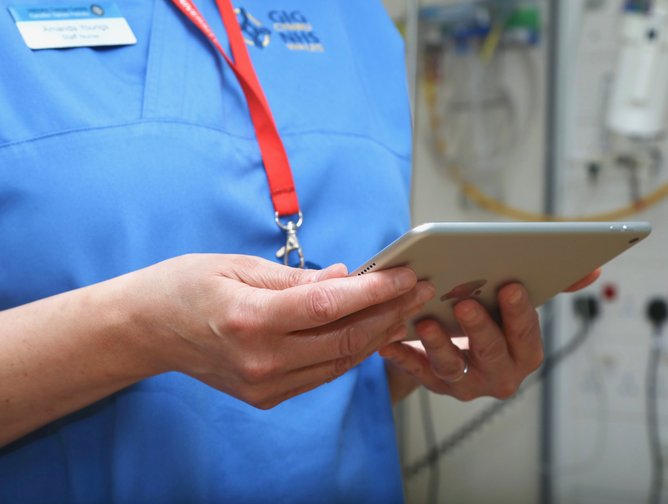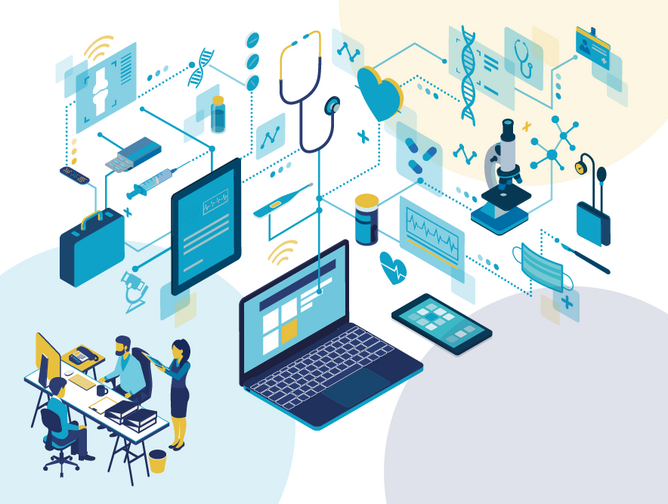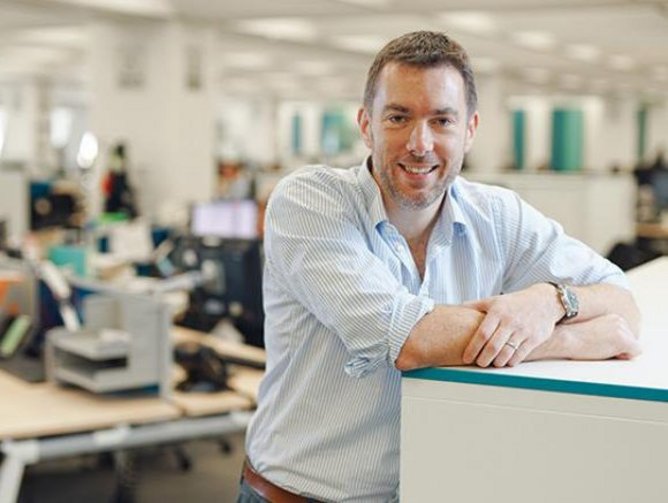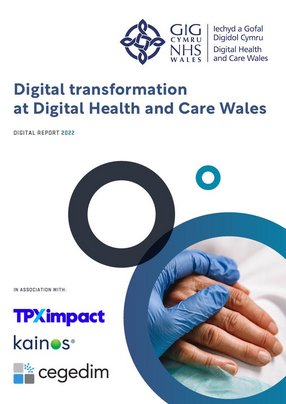Digital transformation at Digital Health and Care Wales
Digital Health and Care Wales (DHCW) is the national delivery body for data and digital services in NHS Wales. It has a pivotal role in helping to drive transformation in health and care. It manages national data centres, the IT and digital services in every GP practice in Wales, core national hospital systems for administration, test requests and results, the Welsh Clinical Portal and various other services. A key part of its service catalogue is data and informatics, through which it provides a consolidated record across all the NHS organisations in Wales, and integration between primary and secondary care. Wales has also been a leader in collecting outcomes data through its Value in Health programme.
Ifan Evans is the recently appointed Executive Director for Strategy and joined the organisation in April. He leads on organisational planning and performance, strategic transformation and change, developing partner relationships, and heads up four of the largest digital transformation programmes (Digital Medicines Transformation Portfolio, Digital Services for Patients and the Public, the National Data Resource, and the Welsh Community Care Information System).
“Previously, I was the Director for Technology, Digital and Transformation in the Health and Social Care Group in the Welsh Government, where I led on national policy and strategic investment funding for digital and technology. One of the things I have been most struck by in my first six weeks at DHCW is the energy and ambition here. I think the confidence and momentum which comes from being a new organisation, and delivering such an impressive digital response to the covid pandemic, will make a real difference to the delivery of digital services.”
The core missions at Digital Health and Care Wales and the digital transformation journey
It was after working with senior management in DHCW while responding to the unprecedented COVID-19 pandemic that Evans was inspired to join the organisation. “It’s a small organisation in growth mode, doing impressive things quickly,” said Evans. “I thought the way things were developed and delivered in response to the pandemic, especially the close working between DHCW, other NHS Wales organisations and local government in Wales, was absolutely brilliant. Compared to some other systems, we delivered better outcomes at a fraction of the cost, which is what you have to do as a relatively small system with limited resources. That was part of why I wanted to come and join.”
Digital Health and Care Wales was recently presented with a Digital Leaders Impact Award for the development of its COVID-19 digital immunisation system. In 2020, it won best UK IT workplace from the BCS, British Computer Society. In 2021 its Chief Executive Helen Thomas was awarded UK Digital CEO of the Year and recently Finance Director Claire Osmundsen-Little was awarded Digital Finance Leader of the Year - clearly there’s something exciting going on.
“That's only been reinforced since I've arrived here,” said Evans. “Just to see the skills and the ambition of teams across the organisation is fantastic.”
There are five key strategic missions at Digital Health and Care Wales. “The first is to provide a platform for digital transformation,” said Evans “We manage data centres on behalf of NHS Wales; we lead on cybersecurity and resilience; we deliver the national network architecture – that's the digital platform that we need for all the different services that are delivered across Wales.”
The second mission is on data, framed as maximising the value of the shared single health and care record across Wales. “Data and information mean everything to health and care professionals, so we have worked really hard over a long time to ensure we have a comprehensive digital record for every patient in Wales, which can be viewed across every setting and every organisation.”
These two missions are the foundation for delivering digital services. “Our third core mission is delivering excellent digital and technology services on top of the data and the infrastructure platform that we have.”
The fourth mission is driving value and innovation, which Evans sees as a way for the organisation to test itself. Are the data being collected and the digital services which professionals use actually improving health and wellbeing outcomes for patients and the public; and driving innovation in the way that health and care services are delivered?
The final mission for Digital Health and Care Wales is to be a trusted partner. “This underpins everything we do. We want people to work with us, and alongside us, to deliver world-class digital and data products which drive transformation in health and care.”
“We can’t achieve our ambitions on our own. It’s more than the NHS Wales family, and wider than health and care Wales; all health systems are facing the same challenges and there is so much we can learn from others across the UK and internationally, and from universities and industry.”
The digital strategy at Digital Health and Care Wales
Evans sees advantages in the way Wales is structured and its relatively small scale.
“It’s interesting that when you go to digital health conferences, it tends to be larger countries who lead on describing challenges and smaller countries who present examples of good practice and innovative solutions. I think it helps that in NHS Wales we are relatively consolidated. We have seven health boards responsible for all health services in their region; they are integrated, from public health through primary and secondary care to specialist services,” said Evans.
Resource allocation and prioritisation in NHS Wales is directed through a planned approach, guided by ‘A Healthier Wales’, a combined health and social care strategy published in 2018. In his Welsh Government role, Evans was the lead author:
“A Healthier Wales has been reinforced in many ways by the COVID-19 pandemic response. There was stronger national direction, digital and data were the main enablers, and all the emphasis was on prevention and on delivering services outside hospital, into communities and homes.” Wales is now using the strategy to frame its approach to recovery and transformation, reinforcing the emphasis on a ‘whole system approach’, and on ‘new models of seamless health and social care’ which are coordinated around the needs of the individual.
Evans is clear that digital data and technology will play a major part in driving these changes, helping health boards deliver earlier detection and diagnostics and more personalised interventions, which focus on improving wellbeing and patient reported outcomes.
Building partnerships for stronger healthcare
Digital Health and Care Wales is building strong partnerships with industry. Red Cortex is a Welsh business which has grown rapidly and was recently acquired by AIM listed TPXimpact.
“We worked closely with Red Cortex on our Office 365 rollout in response to COVID-19,” said Evans. “The team there helped us deploy Microsoft Teams to the whole of NHS Wales in around six weeks and to transition completely to Office 365 in a year. We are working closely together now on our Microsoft 365 Centre of Excellence. We wanted to draw on Red Cortex’s expertise and their understanding of the Microsoft platform, and blend that with our own in-house capability, which has helped us to scale up and to build knowledge and skills more quickly.”
At the multi-national vendor level, DHCW has worked closely with key suppliers like Cegedim for many years and is now developing those relationships into strategic partnerships. Cegedim provided Vision 3, a desktop product for primary care, to just over half of GP practices in Wales. “We work with Cegedim as a key supplier to understand its strategic roadmap, and for its team to understand ours, so that we can look for ways to align our goals. In the end, we all want the same thing, which is better quality digital services for GPs, leading to better outcomes for patients.”
Digital Health and Care Wales is delivering an all-Wales digital medicines transformation programme, which includes electronic prescriptions in primary care. It is also looking to shift key services from on-premises data centres to cloud. “We shared our ambitions for prescribing and shift to cloud, and Cegedim shared its ambitions for the UK market, such as introducing the cloud-based Vision Anywhere product and increasing its market share in England. It is still a supplier, and DHCW is still a customer, but it isn’t hard to find areas of mutual benefit if both parties are committed to working together.”
Evans has a clear vision of what he is aiming for in the ideal strategic partnership. At the top of the list is what the system can offer as an innovation partner, and the reciprocal benefits for Wales in terms of skills, insight and economic development.
What the future holds for Digital Health and Care Wales
Evans knows how quickly digital health is changing, having led the digital response to the pandemic in Wales from the Welsh Government. As well as new and emerging technologies, the strategic context is evolving all the time – cyber threats are increasing, IT supply chains are slowing, and it is getting harder to recruit and retain talent.
“Our ambition is to deliver world-leading digital health and care services for Wales. We are driving towards a standards-based data platform, an open architecture of modular services and APIs, and resilient and secure infrastructure which is shifting to the cloud. I think that globally there has been a big step forward in defining open health care standards, and we want to be at the front of that change. ”
Digital Health and Care Wales hopes that by implementing standards, and opening up its architecture through controlled APIs with well-defined rules and frameworks for access to data and digital services, it will be able to make it easier for others to innovate on the single national platform in Wales. “We need to use standards and open architecture to enable that innovation – which will come from our local health and care delivery organisations, from universities, from industry, as well as from our own teams in Digital Health Care Wales.
“It goes back to the headline mission that we have: to create an enabling platform for digital transformation by giving it a good, solid infrastructure and foundation.”
Later this year there will be a new NHS Wales App, similar to the existing NHS App in England. DHCW has worked closely with NHS Digital to build on its existing product and tailor it to Wales. Evans was the Welsh lead for the jointly developed NHS COVID-19 App across England and Wales, which had localisation and multilingual functionality built in from the beginning. He knew there would need to be a different approach for the NHS Wales App.
“The NHS App was built for England and in English only, but we worked with NHS Digital to take the existing code and adapt it to our needs in Wales. This will include a language layer so we can present in Welsh or English, and other changes to connect directly to our digital systems in Wales, many of which already give us national coverage.”
“The new app is exciting. People's engagement with digital in health and care has completely changed over the last two years, because of things like online test booking, at-home LFT diagnostics, and the NHS COVID-19 App. Over a million people in Wales have registered for a digital Covid Pass and that is a huge boost to digital adoption, which we need to build on.”
Evans knows they need to keep up with that and that there's still a huge recovery task in front of NHS Wales. He is determined that DHCW will help to drive transformation in health and care, but very much aware of the challenges in terms of competing priorities for investment, and the difficulty in recruiting and retaining talent.
Digital Health and Care Wales may be a young organisation, but it has a clear strategic vision and it’s growing fast.




- Ifan Evans


